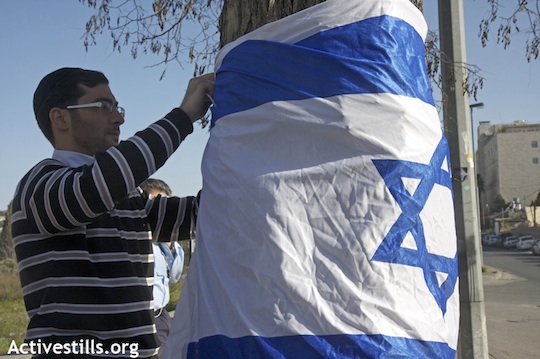What’s in a name? A lot, it turns out. Why the name ‘Israel’ alone just isn’t doing the job.

PLO Secretary General Saeb Erekat touched off a sizable media storm when he asked to remove an Israeli flag hanging above his head as he addressed the Haaretz conference in New York this week. Veteran journalist Dan Margalit from the pro-Netanyahu newspaper Israel Hayom called the conference organizer’s decision to comply a “burning and outrageous mistake.”
But I can’t get worked up about the flag. In fact, lately I have a hard time saying the name Israel at all. And not because I’m anti-Israel. Not at all.
It happened spontaneously, when concerned outsiders, Jews or others, ask me how things are in Israel since the escalation of violence these past few months. I found myself saying, “Well, in the region it’s like this…” or “In Israel and Palestine…” or “You know, in Israel-slash-Palestine…” then fumbling apologetically, “you know, the Palestinian territories…” and rushing ahead to cover my confusion. Suddenly a word that I use hundreds of times a day – “Israel” – no longer seemed to be working right, to describe what’s happening.
The source of the violence is the Israeli-Palestinian conflict. Netanyahu’s incantation of “incitement” is a weird attempt to convey that it comes only from Palestinians, that Israel is not involved. The media treats spikes of violence as a nasty storm, capricious but passing – out of our hands.
But without Israel’s policies, incitement would have much less traction – and there wouldn’t be anywhere near as much of it. If we described the cause of the violence more accurately, we might make better decisions about how to avoid it.
That’s just one situation that prompts my mouth to grope for a better term.
In domestic politics, leaders prefer to talk exclusively about Israel. But Israeli voters have a remarkably sensitive internal sensor that detects where each party lies with relation to Palestinians. Left, center and right in Israel is defined almost exclusively by the conflict (or Jewish-Arab identity issues). Voters position themselves on that axis before anything else. Israel’s internal politics are thus encased in Palestine, gripped by it.
Israeli foreign policy is made or broken on the altar of Palestine. Israel would have an excellent relationship with Europe, for example, if not for occupation and the resultant violations of international law. Instead, that connection is deeply shaken by European labeling, boycott and divestment pressure, and the possible arrest of IDF officers. In turn, the EU is a background target of vicious campaigns against local NGOs who receive “foreign funding” – mostly by the EU or member states – branding the NGOs “implants” and by association, traitors. Germany, a stalwart ally, criticizes Israel only over its treatment of the Palestinians and growing public resentment there is due mainly to the occupation.
As for America, Israel’s best friend, tensions over Iran are receding for the moment. Now nerves are frayed solely by the conflict, which leads to elite scuffles and a growing partisan divide among American public attitudes toward Israel. The Israeli-Palestinian issue is poised to become the biggest – and only – threat to relations with Israel’s strongest ally.
Israelis feel traduced, but mostly they are shocked. That’s because they speak, think and experience Israel without considering Palestine. They cannot understand why outsiders don’t think of Israel this way as well.
But foreign policy isn’t just about the West. Israel urgently needs a regional approach, given the current mayhem in the Middle East. There, the occupation remains an angry flashpoint for Arab countries; potential allies will never normalize the current situation. Still, Israelis believe that those countries just hate Israel as if Palestine doesn’t exist, skewing their analysis of prospective regional alliances.
Finally, on the economic level, there is no Palestine without Israel. Or vice versa.
Palestine uses Israel’s currency, conducts the vast majority of its trade with Israel, needs Israeli approval for any imports, exports, travel abroad – all of which are restricted – and tax collection.
Israel’s domestic budget too is defined by its policy on Palestine. The country’s per capita investment in settlers is higher than in the country’s poorest communities. The massive military budget leaves less for all other areas of life. At the same time, whole sectors are invested in, and profit from, the occupation. It may not be not totally clear whether there is net financial gain or loss but there’s no question that the economy in Israel and Palestine is shaped by Israel in Palestine.
***
The term “Israel” simply isn’t accurate enough to describe the things that most affect our lives here. This isn’t an ideological statement against Israel or in favor of a confederated or binational state. It is the reality today.
While we were arguing about what happened in the past or where to go in the future, we failed to notice as the present took new shape. Two people and territories are intertwined and interdependent geographically, politically, economically, and socially, and that is not scheduled to change.
If we call the situation what it is, and stop pretending it’s temporary, could we take more accurate measures, or make better policy? Realize that Palestinians and Israelis are not the “other”– but a piece of the body politic called “us”? We all have family members we don’t like, but we understand and accept them more than those outside the fold.
Maybe then we would realize why Saeb Erakat wanted one flag removed. His people are locked together with our people, but only ours are represented. Perhaps Erakat wouldn’t have needed to take the Israeli flag down if someone had raised a Palestinian flag. That would have reflected reality – then maybe we could move on and start solving problems.


